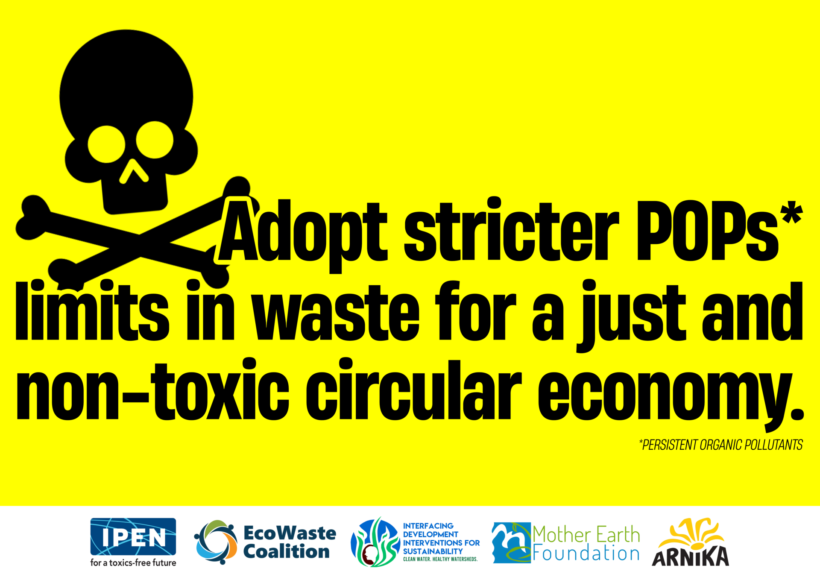5 June 2022, Quezon City. As World Environment Day is celebrated, non-profit groups campaigning for a zero waste and toxics-free society pressed the Government of the Philippines to back stricter limits for persistent organic pollutants (POPs) in waste to avoid contaminating the recycling chain and halt hazardous waste imports.
In a press statement, the EcoWaste Coalition, Interfacing Development Interventions for Sustainability (IDIS) and the Mother Earth Foundation (MEF) prodded the Philippine delegation to align itself with African nations in seeking stricter levels for POPs in waste at the Conferences of the Parties of the Basel, Rotterdam and Stockholm Conventions (BRS Triple COP) to be held in Geneva from June 6 to 17.
Fifty-three countries belonging to the African bloc are advocating for stricter limits for POPs such as polybrominated diphenyl ethers (PBDEs) in waste under the Basel Convention, to stop imports of PBDE-containing e-waste into the region and to end the recycling of POPs waste into new products.
“Countries on the receiving end of the inequitable global waste trade will suffer more if parties accept less stringent limits for POPs in waste,” said Aileen Lucero, National Coordinator, EcoWaste Coalition, as this will encourage more hazardous waste exports. “Delegates must negotiate with the paramount interest of people’s health and the environment in mind and decide on the most stringent limits that will in effect block the transfer of POPs-containing products and wastes to developing nations to protect vulnerable populations and ecosystems.”
“Lower threshold values for POPs in waste will prevent such waste from being exported to the Philippines and other countries under the guise of recycling,” said Atty. Mark Peñalver, Executive Director, IDIS. “If stricter limits are adopted, governments can then enact regulations based on these limits to stop the entry of POPs-contaminated wastes into our ports, markets and households.”
“Establishing stricter limits is necessary to ensure that waste materials containing POPs do not contaminate the recycling chain with these persistent chemicals. New products should not be created using old POPs as this toxic recycling will further pollute the local and global environment,” said Sonia Mendoza, Chairman, MEF, stressing “this is not the type of recycling that zero waste advocates want, which is poisoning the circular economy we aspire for.”
POPs waste is defined, according to Article 6 of the Stockholm Convention, by setting Low POPs Content Levels (LPCLs). This establishes an important kind of “limit value” because POPs waste should be treated such that POPs are either destroyed or irreversibly transformed.
As emphasized by the International Pollutants Elimination Network (IPEN) in the fact sheet made available to BRS Triple COP delegates, POPs waste “cannot be landfilled, reused, or recycled, because POPs content in that waste would also be recycled and thus would not stop this chemical pollution from entering the environment,” stressing further “neither can POPs waste be exported to countries lacking the capacity for its destruction or transformation, which in most cases means it cannot be exported from developed to developing countries.”
“We urgently need stronger LPCLs in waste and stronger implementation of the Stockholm Convention to protect our health and the environment from these long-lasting chemical threats,” said Dr. Jindrich Petrlik, IPEN Advisor on Dioxins and Waste, and Program Director for Arnika. “The LPCLs proposal from the African countries should be adopted and we must develop a Plastics Treaty that promotes innovation for safer materials and provides pathways to urgently eliminate production of plastics that contain toxic chemicals.”
Arnika, IPEN and other environmental and health groups have long called for stricter limits on POPs in waste and other standards to reduce the impact of these substances on human health. Recent IPEN and Arnika reports have documented the presence of POPs in consumer goods made from recycled plastics, as well as in soil, eggs, and fish, demonstrating the transmission of the dangerous chemicals in food to the human body.
For instance, free-range chicken eggs collected in the vicinity of plastic waste disposal sites in 14 countries, including the Philippines, were found to contain some of the most toxic chemicals ever studied, including PBDEs, polychlorinated biphenyls (PCBs), short-chained chlorinated paraffins (SCCPs), and unintentional byproduct POP like dioxins.
Arnika, EcoWaste Coalition, IDIS and MEF are participating organizations of IPEN, a global network forging a healthier world where people and the environment are no longer harmed by the production, use, and disposal of toxic chemicals.
References:
https://ipen.org/site/why-low-
https://ipen.org/documents/haz
https://ipen.org/news/european
https://arnika.org/en/news/can
man-health-globally
https://ipen.org/documents/pla
EcoWaste Coalition
Phone: +632-82944807 E-Mail: info@ecowastecoalition.org
Website: www.ecowastecoalition.org, http://ecowastecoalition.












